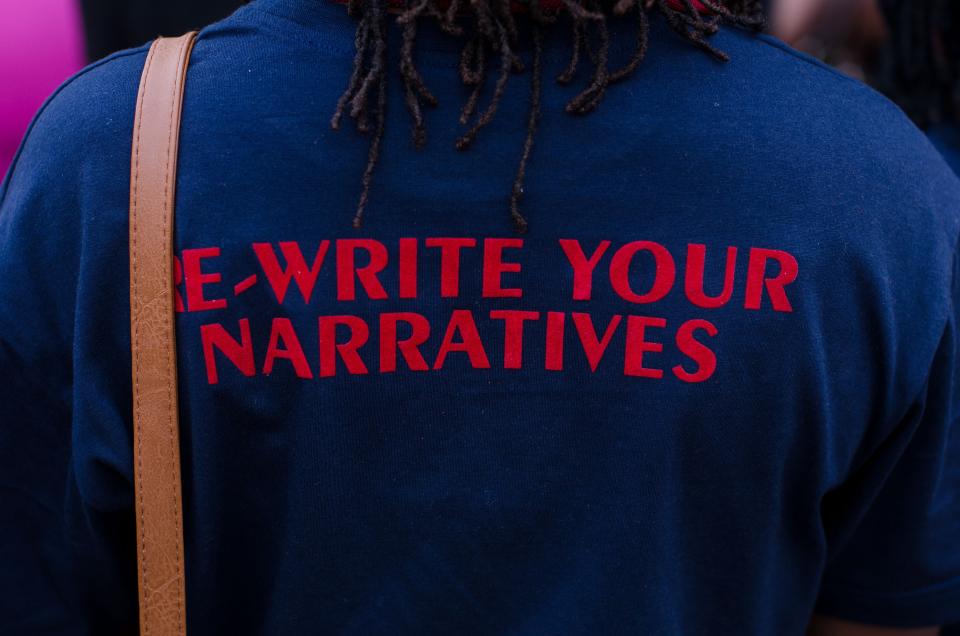
"Re-write your narratives." Photo from Women's March in Ghana, 2018. Photographer:Owula kpakpo. Image source: Wikimedia commons
Since its introduction in Ghana in 1993, the internet has provided numerous opportunities to Ghanaians among them, the ability to create networks, share information, as well as communicate. Today, Ghana boasts of about 10 million internet users and ranks 28th out of 55 countries on the continent in terms of internet penetration.
Despite the many advantages the internet has brought to the citizenry, it has turned to serve as a double-edged sword by posing threats and risks such as harassment to the most vulnerable groups – mostly women. In 2010, Ghana, long viewed as Africa’s "flawless gem", had its sparkling reputation tarnished. In a report published that year, Ghana gained the unsavoury distinction – along with Anglophone African neighbours Nigeria and Cameroon – as one of the top ten cybercrime generating states worldwide[1].
Despite the many advantages the internet has brought to the citizenry, it has turned to serve as a double-edged sword by posing threats and risks such as harassment to the most vulnerable groups – mostly women.
A baseline study conducted by the Media Foundation for West Africa (MFWA) revealed that online harassment is one of the major risks facing women online in Ghana. The study further revealed that this Cyber harassment manifested in the forms of non-consensual sharing of intimate images, Cyberstalking, and hate speech. 39% of the women respondents in this study are reported to have experienced some form of cyber harassment, with 68% reporting to have experienced repeated harassments two or more times.
“Cyber harassment or bullying is termed as the use of email, instant messaging, and derogatory websites to bully or otherwise harass an individual or group through personal attacks. This can be in the form of flames, comments made in chat rooms, sending of offensive or cruel e-mail, or even harassing others by posting on blogs or social networking sites. Other forms include non-consensual sharing of intimate images (“revenge porn”) and cyberstalking": Excerpt from report by Media Foundation for West Africa

Women's March Ghana 2018 was organized in Accra, Ghana. Photographer: Owula kpakpo. Source: Wikimedia Commons
Some notable cases of Cyber Harassment of Women in Ghana
Early this year, there was an incident where a video of a school principal went viral. In the video, the principle was seen to be having sex with his student, whom he alleged was his girlfriend. The video elicited a lot of debate and scathing attacks from netizens, mostly directed at the female student.
In a different incident, a young man was arraigned in court and charged for publishing a nude picture of his ex-girlfriend on Facebook after the two allegedly broke up. The image was widely shared thus attracting a large number of viewers. This act is said to have caused adverse psychological trauma to the lady in question.
Women celebrities have not been spared either.
Similarly, women celebrities have not been spared either–Yvonne Nelson–a Ghanaian actress, for instance, was brutally harassed continuously. Images about her private life were widely shared online by malicious people, prompting a lot of name calling from online users. Some of Yvonne’s peers have had to justify themselves, and or defend themselves in efforts to “restore” their public reputation. For some, the end result was blocking the harassers, while others opted to shut down their accounts, and or creating new ones.
Counter Measures to check Cyber Harassment
While Ghana has no clear legislation in relation to online harassment, existing and outdated provisions such as Articles 12 and 18, subsections 2 of the 1992 constitution, spell out the provisions guaranteeing the protection of the rights and freedom of others.
Article 12 subsection 2 of the 1992 constitution of Ghana states that:“Every person in Ghana, whatever his race, place of origin, political opinion, colour, religion, creed or gender shall be entitled to the fundamental human rights and freedoms of the individual contained in this Chapter but subject to respect for the rights and freedoms of others and for the public interest.”
Article 18 subsection 2 of the 1992 constitution also states: “No person shall be subjected to interference with the privacy of his home, property, correspondence or communication except in accordance with law and as may be necessary in a free and democratic society for public safety or the economic well-being of the country, for the protection of health or morals, for the prevention of disorder or crime or for the protection of the rights or freedoms of others.” [2]
In February 2018, the parliament initiated discussions on the possibility of enacting stringent laws that deal with incidences of non-consensual sharing of intimate images, also referred to as “revenge porn”.
Ghanaian legislators, however, seemed to differ on the best way to curb online harassment manifested in the form of non-consensual sharing of intimate images. While some felt that legislation would protect and respect privacy, others were of the view that online users should be left to practice “self-censorship”.
While some felt that legislation would protect and respect privacy, others were of the view that online users should be left to practice “self-censorship”.
One such legislator is the Minority leader Haruna Iddrissu; in his address to the assembly speaker, Haruna called for the “conscious use” of mobile phone gadgets, reiterating that this would curb their continuous abuse.
There have been concerted efforts by various non-state entities to sensitize the public on online harassment and non-consensual sharing of intimate images. Entamoty Media, for example, launched an initiative dubbed #EndRevengePorn. The overarching aim of the campaign was to bring to the attention of lawmakers on the need to draft laws to punish perpetrators of non-consensual sharing of intimate images.
On their part, Tech and social media platforms such as Google, Twitter, and Facebook have policies and tools in place to take down such nude images once flagged by their users.[3]
The overarching aim of the campaign was to bring to the attention of lawmakers on the need to draft laws to punish perpetrators of non-consensual sharing of intimate images.
The Final Analysis
Ghana as a country has reached its height of being recognized worldwide as being among the first to introduce the internet in sub-Saharan African. Other countries on the continent look at Ghana as a benchmark for their cyberspace progress. But why is the administration reluctant to enact laws aimed at protecting vulnerable online users from harm?
According to Media Foundation for West Africa (MFWA), “the government has done little with regards to interventions geared at protecting the right of women online. While the ministry in charge of ICT has strived to come with measures such as Ghana Computer Emergency Response Team (CERT) to monitor online incidences to ensure the safety of online users (both male and female), there appears to be the absence of a clear initiative aimed at protecting women’s right online”.
While the ministry in charge of ICT has strived to come with measures such as Ghana Computer Emergency Response Team (CERT) to monitor online incidences to ensure the safety of online users (both male and female), there appears to be the absence of a clear initiative aimed at protecting women’s right online
Sarah Abena Fosu, a women rights activist, echoes this sentiment. They cited the lack of a legislation in place to ensure the safety of women online and noted however that there was legislation in place whose primary objective was to protect children against online harassment and exploitation. Sarah revealed that their organization was trying to advocate for laws that will protect women against harassment through both new media and traditional media. Further, that there is a team that was lobbying for gender sensitive reporting laws aimed at empowering women.
The above sentiments showcase a clear indication that there is need to call for a multi-stakeholder approach, in efforts to vouch for legislation and policies that ensure safe online spaces for the vulnerable – especially for children and women.
This milestone will be key in guaranteeing that women in Ghana indeed utilize the opportunities provided by having internet access without the potential adverse effects, thus enabling women to attain economic self-reliance, have their voices heard, and last but not least, address persisting gender inequality.
Footnotes
[1] Warner. J. (January-June 2011). Understanding Cyber-Crime in Ghana: A View from Below. International Journal of Cyber Criminology. https://www.cybercrimejournal.com/warner2011ijcc.pdf
[2] Constitution of the Republic of Ghana (1992)
[3] Entamoty Media. (31 June 2017). Entamoty Media to launch Campaign Against Revenge Porn in Ghana. Business Ghana. http://www.businessghana.com/site/news/general/149507/Campaign-Against-…
- 10842 views






Add new comment